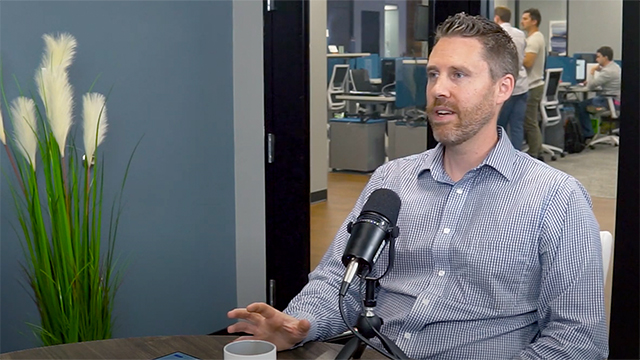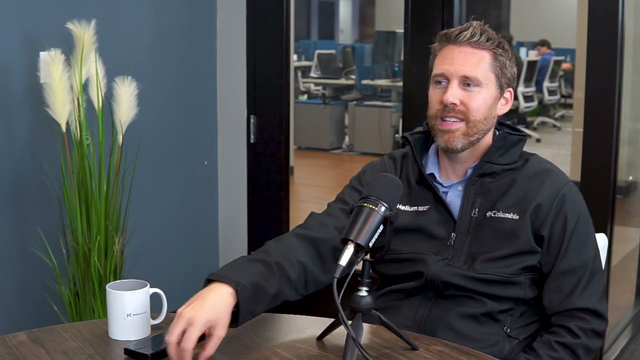Tim Warren: If Google was so far ahead and had the leader, the leading advantage in every area, why did they lose? Like, why didn’t they build ChatGPT?
Paul DeMott: I think they probably just weren’t trying to build that product in particular because of the potential risk it had to their own product. So I mean, something that we’re seeing as an SEO company is because ChatGPT can generate content so well, you know, people are using that for, content at scale in their company. So, if they would have actually developed this capability of generating text, it would have cannibalized their 40 billion dollar product, which is their search engine. And I think they weren’t necessarily ready for how advanced these things could actually get in a short period of time.
Tim Warren: Yeah, that’s really interesting. So do you think it was a little bit of Kodak where they sat on the digital camera because it would eat into the profits of the film business?
Paul DeMott: I think that’s probably a good way to put it. Yeah.
Tim Warren: Okay. That’s interesting because I’ve wondered for a while, you know, if Google really had the leading advantage, why would they wait for Bing to create something? Well, Bing invested in it, but why would they sit back and wait for OpenAI to compete with them when they could have built this years ago?
Paul DeMott: Oh, yeah. I mean, I think everybody is perplexed right now, the fact that, you know, what people are saying is that at Google there is a lot of panic. Just in the last I think it was like 2 or 3 weeks ago, one of their lead developers left and he left Google because he feels like they’re in such a panic right now that they’re doing whatever it takes to build a product that can compete. But the risk is if this AI develops too quickly without the right measures in place to restrict it, then we could get in a situation where AI starts to become pretty dangerous. So it just looks like it’s complete chaos over there.
Tim Warren: Yeah, no, that’s really interesting. And obviously as a Google partner, we don’t want to see anything happen to Google, but what do you predict in the next 1 or 2 years? What do you think is going to shake out? Because Bing is coming after Google, they’re trying to, so what do you think is going to happen?
Paul DeMott: Well, I think the answer actually lies into how we’re seeing early adopters use ChatGPT. So me as a developer, for example, I am using ChatGPT to help write code. Before, it wouldn’t be difficult for me to do, it’s just super easy stuff, but it would take me a long time and it would be really tedious. So I’m having to do that. The other thing I’m having to do is, let’s say I run into a bug, I used to Google search and I’d spend a long time using Google as a search engine to find a stack overflow that was relevant enough to try to help me find the problem. Now, I first consult ChatGPT, and most of the time it gives me an answer out of the gates before I go to Google. So, I’m finding answers to things quicker. So, I think really what we’re going to see is in any instance where people are actually looking for a specific answer or they’re trying to solve a very specific problem, this isn’t going to affect searches where people are buying products or they want product reviews, but wherever there’s a specific answer and before you had to query, look at a document, scan through it, try to find the answer that’s going to be replaced now with what the search engines are starting to roll out, which is the very top of the search, just getting a direct answer to your question.
Paul DeMott: So, I don’t know what percentage of Google searches are those. But I think any time where someone is trying to just find that one thing, we’re no longer going to have to go to websites and search throughout the content to find that, it’s just going to be at the top. And so actually what Google has sort of announced now that they’re working on, is when you do type in sort of a question based query into a search engine, they’re going to return at the top, basically your answer, and they’re going to say, we pulled this answer from this website, this website and this website, and then below that section will be the search results that everyone’s accustomed to. So I see that as being a huge time saver. I don’t think people quite realize how much time they waste when they’re Google searching, just finding a result that answers their question.
Tim Warren: Yeah, no, I think it’s important because let’s say I wanted to change the tires on my truck, right? If I go to ChatGPT and say how to change the tires on a 2021 F-150, it’s just going to tell me how to do it. Step one, open the back rear seat, this is where it is on that model. Step two, do this and this and this. Versus Google. I Google that and I get four YouTube videos and f 150 world. You have to click on that and read the whole thing.
Paul DeMott: A video even. So one thing too that is getting rolled in is that Google has long been transcribing all the YouTube videos. But I personally, if I have to fix something, like I had to fix my filter for my swimming pool this weekend. I just find it so frustrating to have to pull up a YouTube video, watch the intro, watch them talk about all these other things and then just find this ten second period where they actually address the thing I’m looking for. So that’s how I’m using ChatGPT. Today, I actually went to ChatGPT and asked it the question. It pointed me in the direction and I was able to solve the problem just like that.
Tim Warren: Man, I feel like you have constant problems with your pool. Like every time you talk. The problems you are solving is with the neighborhood parking situation and your pool. 95% of your problems you’re solving.
Paul DeMott: Yeah, a pool is like owning a house. It’s a second house. You’re just always fixing it.
Tim Warren: Now, you know why I don’t have a pool.
Paul DeMott: Yeah.
Tim Warren: So, let’s talk about for brands, right? Because I think some of these just information based queries where it’s how to fix pool filter or change tire on F-150 or whatever. But what about for brands? What’s going to happen if you’re a SaaS company or you’re a retail e-commerce company or your B2B or whatever it is, where you’re selling online, you’re using SEO as a major converting channel, what’s going to happen there. And what do brands need to know? Because just thinking about that, if you used to, you know, let’s say that you’re a SaaS for ERP, right? Enterprise resource planning tech or whatever, you have a platform and someone Googles best ERP for inventory or whatever. And then now Google just gives you an answer. And we pulled from these sites, you’re going to lose brand equity if you used to be spot one for that. All that traffic went to your site and converted. Now there’s an answer and they have to read that and then maybe they click on you. So what do brands need to know about that and what should they be doing now to improve their opportunity to win in this new landscape?
Paul DeMott: For sure. Well, I’d say , one, I think Google is going to stay away from a lot of low funnel terms. So, for example, if someone types in best TV for my living room, it’s going to get them in a lot of hot waters if they just decide arbitrarily that we’re going to say this TV is the best. So I think that the low funnel terms that are really commercial or if someone types in best consulting services near me, terms like that, I think Google is going to stay out of trying to have the AI make it inform you. It’s just going to lead to money under the table if they do that for for ethical purposes. I think they’re going to stay away from low funnel. But I think where clients today need to be paying attention is actually medium to high funnel content. A lot of people today get people into their sales funnels by writing content that’s just really high funnel. So, what chlorine options do I have available for my swimming pool? Someone like one of our clients might try to get someone to their website, start to establish themselves as an authority on that subject and maybe even remarket to those people.
Paul DeMott: But I think a lot of those searches now, people are no longer going to click on a website to read that content. Instead, it’s going to be served up to them and they may not really care who it was that put that in front of them. And then even though you’re providing useful content that Google’s ultimately using to answer the question, you’re not getting a chance to remarket to those people because they’re not coming to your website. So it’s actually this double edged sword because right now it’s from an SEO standpoint, really helpful to build topical authority. It’s good to build all funnels of the content, high funnel, medium and low funnel. But I think that’s the thing that people have to be really cautious for in the future, is that all these pages that are high funnel that used to get your website a bunch of traffic, that you would then remarket and drive down the funnel, are potentially going to go away once Google rolls this stuff out.
Tim Warren: That’s really interesting. The search won’t go away. It’s just your ability to rank for it will go away.
Paul DeMott: You might get credit for having answered it, but who’s going to read that we pulled this result from these three sites?
Tim Warren: Do you think those will be hyperlinked, like they can click on them? Or is it just going to be cited?
Paul DeMott: So far in the visuals that they’ve shown of the actual tests, you can click on them. So there’s some chance, if you don’t fully answer the question, that they’ll click on it and then you have now a chance to remarket to those people. But now you’re going to be producing a lot of very quality content that’s going to help Google but not necessarily help your website anymore.
Tim Warren: Yeah, that’s really good to know. I think this is really smart because if a lot of your traffic comes from this really high funnel terms and those are going to get disrupted, it’s probably important now to start focusing on low funnel, right, ranking for the best or the near ME’s or the the ones that’ll be really hard for Google to disrupt with AI, which is interesting. I’ll tell you a quick thing because I was on ChatGPT and my big thing I’m trying to solve in my house is my grass. So I have grass envy right now. You know, I’m Tim and I have grass envy. When I drive through my neighborhood, there’s this really nice yard and it’s nice, thick grass, uniform. And then I went to my yard and it’s like all patchy and weeds. And I’m like, All right, I don’t know what happened, but my grass got really trashy, so we got to fix it. So I’m trying to find landscapers and then I’m going down the Google rabbit hole of, well, is it landscaping or actually, do I need fertilizer? Oh, there’s actually companies who just do fertilization and weed technologies.
Tim Warren: They don’t even do grass cutting. So then it’s figuring all that stuff out. I went to ChatGPT just for fun and said, who are the best landscaping providers in Cincinnati? Give me recommendations. It came back and said, I am an artificial intelligence and I’m not allowed to recommend products or services. And I’m like, but I want you to. So it said, I’m not allowed to recommend because Bing can’t get into the hot water of saying, use this group, this group and this group. Then all of us are like, What the frick? You recommend all my competitors, how do I get on that list, right? And then it just becomes paid. But then because it becomes paid, people know now it’s just a paid resource and it’s basically Angie’s List, right? It’s really interesting how they’re going to fight this battle essentially, of how do you continue to make things truly organic content, but yet Bing and Google are going to be completely deciding it’s no longer going to be a curation of the web, it’s going to be their AI.
Paul DeMott: I think people are going to be really mad, too, because there’s a lot of businesses that have invested a lot of money in answering these questions and supplying good information to the user. Google is just going to take their information to basically pay for ads by answering people’s questions. There’s talks of other search engines like Ahrefs, one of the tools that we use for SEO, I don’t know what progress it is at, but they want to build a search engine that’s a little bit more like YouTube, where content creators actually get paid for the content they produce. So, if it was used in an AI answer, maybe you could get credit for it. Today also, ChatGPT, its capabilities are the result of all the content producers across the whole web. I mean, it’s crawled tons and tons of content and it’s free to do that. It doesn’t have to get permission or anything to use people’s content. So, I think if people start producing content, Google starts using it to make money themselves. Then people are going to start very quickly stopping producing new information. Because search has to constantly stay up to date with the times. Most queries being searched are brand new based off new events, etcetera. We could see a situation if they don’t compensate writers where writers go on strike and stop producing stuff.
Tim Warren: People will do what you motivate them to do. And if you demotivate by stealing traffic from them and not paying them, they’ll stop doing it. That’s interesting. So I know we only have a few minutes left in this episode, but what are your thoughts in terms of takeaways? Because you’re painting a relatively gloom and doom or gloomy picture for, let’s say, small or mid sized brands who may not be Home Depot, who are going to rank for stuff no matter what because they’re a seed site. But what do you think for these small and mid sized, what should they do today? Because you mentioned don’t go after such high funnel content, perhaps. But what if that’s all they can rank for? What if they can’t compete for some of the best, enterprise software because of the G2 crowd and it’s these highly competitive keywords, are they just screwed? Is it kind of like, you can’t do SEO? What do they what do you recommend in those scenarios?
Paul DeMott: I think there’s still a lot of opportunity. I would say, today this change hasn’t taken effect yet. Sure, they might roll it out, it might roll back. So, today you can still go after some of those higher funnel terms. But I think it’s just being really strategic when you decide you want to create content from an SEO perspective, ask yourself whether or not the search term that you’re building a content piece around could be answered in a yes or no form or with a a single sentence. If that’s the case, then I would just say, push that down the priority list, it’s not as important. What you really need to do now is pay a lot more attention to low funnel content. And in every industry, no matter who your competitors are, there are also low funnel terms that they miss. So doing really good keyword research to find terms that your big competitors just don’t turn an eye to, maybe they’re too low volume. Having, I’d say, a sniper approach instead of a shotgun approach. The nice thing is, a lot of the competitors that own the landscape today, they’ve done so via shotgun. Their sites are just humongous. The content pieces they tend to create tend to cover broad categories. And so one way you can beat them on the low funnel is by writing hyper specific content that’s more specific than what they can write. So I would say, this hasn’t taken effect yet, so no one should panic.
Tim Warren: When do you think it’ll take effect?
Paul DeMott: I’d probably say next quarter is when they’re going to start rolling it in. We’ll start to see an impact then, but I would just say for right now, really make sure that you’re covering what you can on the low funnel and that’s going to protect you going forward.
Tim Warren: So, we have a few more minutes left and I have many more questions to ask. I think one of the biggest things a lot of listeners or watchers, whatever platform they’re absorbing this content on, I think a lot of people wonder about AI content because obviously with all these changes, one of the first natural things people think of is well, okay, if AI is going to be reviewing content and choosing, why don’t I use AI to write my content? Why don’t I fight fire with fire? Right? Which makes total sense. And we agree. But at the same time, obviously now if some of the high funnel, mid-funnel stuff could become way more competitive, do I invest there or do I not invest there? Other people have this thought of is all AI content bad? What if you use tons of AI content? Is your site going to get banned? Is it black Hat? There’s a lot of these questions out there. So, let me ask the question to you, Paul, what are your thoughts in terms of using AI content and how you might be able to use AI content to combat what’s coming?
Paul DeMott: I think that’s a really good question and it’s probably part of my answer to the other thing. So the medium to high funnel content, instead of spending, hundreds if not thousands of dollars to write really high mid to high funnel content, which is what a lot of companies have done to get that content. Just let the AI do that. So save costs there and invest your time and money into extra copywriting and editing into your low funnel content. I’d say arguably that ChatGPT four is producing the high funnel mid funnel content better than a lot of writers can. It’s not going to be as tailored to your brand. It probably won’t match your brand voice quite as well as if you have your other writer, but you can generate this content at, fractions and fractions of the price. What I’d really recommend is it’s still valuable to create that high funnel mid funnel content, but don’t go and spend all of your money on that. Use AI to generate that.
Paul DeMott: And the other thing I’ll add too is a lot of people are afraid to use AI content because they think Google is going to be able to detect it. But as we talked about at the beginning, Google is a little bit behind the ball right now. They definitely are not able to detect it. But there was a paper that was published last month in April that showed that it was actually mathematically impossible to consistently identify content that was written by ChatGPT. So everyone who’s trying to build these detectors, even Google themselves with all their technology, will not be able to distinguish it. There’s too many variables going into it. So for people that have that concern, just know it’s been established to be mathematically impossible to detect it, which means Google can definitely not do that at scale. They crawl trillions of pages, so that uses a lot of computer resources. Also the resources to try to detect it are impossible. So I think people should use it to their advantage right now.
Tim Warren: In addition, I want to add this for people who don’t know, but one of our clients, a PE firm that we work with, they send us a lot of business because they invest in B2B portfolio businesses or B2B SaaS companies. And so one of the questions got asked from these companies are, Hey, we want to use AI content, but how much is too much? Where’s the line? What’s white hat, gray hat, black hat? Where are we going to get banned? And so I wrote almost an eight page article on this to send to them, which we could we could link in the description below, basically it’s our stance on AI content and why it’s going to be completely against Google’s own interests and their own business model to ban AI content. Essentially I’ll hit the kind of high points. But number one, Google came out on Developer.google.com, I think it was early in the year like Q1 or Q2 March. They actually came out and they wrote and they basically said we are not going to penalize AI written content. In fact, it’s okay to use AI content as long as it follows the E-e-a-t framework, right? Expertise, experience, authority and trustworthiness.
Tim Warren: And so if you create content that is authoritative, that they trust because they trust the writer and know who you are, right? You’re not a random person writing about medical terms. You’re an MD writing about medical terms or reviewed by a medical professional. And you have you have expertise and you have experience. If you do the E-e-a-t framework, they said we don’t really care how it’s written as long as it fulfills the client’s query, the user’s query, it’s well written and it follows e-e-a-t. So that’s the first thing, if you’re listening, you need to know is that Google has come out and said it’s okay to use AI content as long as it’s good quality content. Helpful content. So that’s point number one. Point number two is in terms of how much is too much, this is obviously a difficult question to answer. What I always tell clients is I think it’s probably black hat to create entire websites fully using only AI generated content articles and whatever, and even imagery and whatever. It’s probably not wrong, but I’ve gone on YouTube and I’ve seen ads now that are completely AI generated and they’re kind of creepy.
Paul DeMott: Oh yea, the pizza ones.
Tim Warren: There was one last night I was watching, it was a concrete eating contest. And it’s a bunch of like Elon Musk and famous people eating concrete. It’s this hilarious thing and you can tell it’s fake, but at the same time, it’s kind of real. And wow, the deepfakes are going to get really, really hard to tell in the next five years. So that’s a whole other thing. But when you look at the AI, you say, this is entertaining, but I can clearly tell this is not real, right? So I think it’s the same, if your strategy is let’s just build ten websites and use AI to do everything. It’s not going to be as good. But if you’re using AI to write half of your content, that’s probably okay. But even what I would say, what we’re recommending, Paul to a lot of our clients is, have AI write it, have a human edit it. So that it’s reviewed by a human to make sure that when you see the pizza video and you’re like, this part is just weird, just cut that out of there, right? Cut the weird parts out, have the human edit it. Instead of having writers write everything from scratch all the way, you don’t need to do that. You don’t need to write it from scratch now. Have the AI generate the content, use good tools, which we can talk about in a second, and then have your editors edit it. So it does sound like it came from a human, but they didn’t have to write the whole thing from scratch.
Paul DeMott: Yeah, and I’d say too, where I think Google is going to spend their time with AI content is on the factual accuracy of it. A common problem right now with AI is it does this thing called hallucination which has sent me down these terrible rabbit holes before. So I was writing a script for something.
Tim Warren: Let’s clarify, you’re hallucinating because of things you’ve taken that have sent you down rabbit hole?
Paul DeMott: This is ChatGPT, but I was writing some code.
Tim Warren: I’m just saying because there’s probably people listening who have taken certain substances that have caused them to hallucinate down certain rabbit holes. So we’re just clarifying that’s not what was happening to you.
Paul DeMott: Just to clarify.
Tim Warren: Okay. Just clarifying. Got it. Okay, good.
Paul DeMott: So I was using ChatGPT for code documentation. There was a specific function that I asked it, how do I do this with this other person’s code base? And it gave me a function. So I spent a couple hours implementing it. And then when I ran it, it just didn’t work and I was getting no error messages. And so I just kept trying different things and I just was like, This is not working. So eventually I had the idea, let me actually go to their website and read their actual documentation, and what ChatGPT had told me to do was completely made up. They did not do any of the things that it told me to do. So I wrote all this like junk code that was for something that didn’t even exist. I’d say ChatGPT is a lot like a person where it just knows how to say stuff that sounds right. It’s been known to, for example, make up citations that look completely real, like fake studies that don’t even exist really, validate its points.
Paul DeMott: It’s just an ongoing issue. What I was going to say, though, is when it comes to using AI to generate content, it’s very important, I’d say, to have a human read it because where AI can go wrong, it’s not detectable for this because humans can also go wrong here, is that it can just make stuff up. And what Google is working on is building it like a set of facts that are basically improved upon as it reads more and more information and it will compare its set of facts to the set of facts that you’re claiming in your article. And if your chatbot is just hallucinating, saying made up stuff, and you generate a whole site based off of that, that’s a problem. So I think that’s another reason that really the thing that works best is AI generation plus human editing. It will avoid you getting into trouble. But then honestly, when we do that, we can get content to the same place that it was with just human writing.
Tim Warren: A lot faster for a fraction of the cost. If you’re listening to this podcast, Helium has several tools in our disposal. And I’d like to take just a couple minutes to talk about that because there’s a lot of stuff out there now and there’s also ChatGPT. You can use GPT 3.5, GPT four, but those were not built for SEO, right? And so can you talk for a minute about Noble and H1 and what they do and why they exist and how they work? Because obviously we have a vested interest. We believe AI content is really important, but I would love to hit on those really quickly because I know those tools are really crucial to a lot of companies that we work with now. But what are they? Why do they exist and how do we use them?
Paul DeMott: Yeah, for sure. So I would say one thing we get asked all the time by our clients is how are you guys using ChatGPT? Or should we be using ChatGPT to generate content? So everybody has started to realize, or most people at this point, not everybody, has started to realize that ChatGPT can generate content at a way lower price than if you do it in house. But the problem is, let’s say one of our clients were to go do it themselves, if they were to go in to ChatGPT, they’d start to run into a couple of big hurdles. So first, let’s say they ask it to write a content piece on a specific keyword. One of the first hurdles they’re going to encounter is that the content length is probably not going to be optimal. ChatGPT tends to only write 500 words at a time, especially if you’re in the interface. But in order to rank and be relevant for content, normally you have to have about 3000 words.
Tim Warren: Yeah, 500 is too small, too short.
Paul DeMott: So that’s going to be one of the first hurdles. Content length is going to be really tough and you’re going to spend a lot of time trying to stitch stuff together. And so one thing that Noble does is, we’ve already done all the prompt engineering. We’re also stitching together a number of different prompts in order to hit the content length necessary.
Tim Warren: And you can program it too, right, to say, hey, I need a 3000 word article or I need a 5000 word article?
Paul DeMott: Yeah, you can give it ranges. So just like a person would have a hard time fitting it all into a specific number, it can fall into that range. The other really big thing is normally if you do a ChatGPT and ask it to write an article, it’s going to try to write an article that would be ideal, kind of like on its own, not for a search engine. So search engine content is different than content that you might send to a friend for entertainment to read or news publications. It’s not really content that most people read from top to bottom. SEO content is more, you know, its purpose is to answer all the different types of questions or queries or intents that someone might have about that subject matter. And so if you, without training, go in and ask ChatGPT to write you an article, it’s going to write you an article that might read good to you, but it doesn’t have the characteristics that make for a good SEO page.
Tim Warren: It’s like the common meme, right? Where it’s like an SEO walked into a bar, bars, pub, tavern, whiskey.
Paul DeMott: What is a bar? Those are features of good SEO content, they define things, they provide definitions, versus people don’t really want to read that content from top to bottom. They’re just going to scan it and jump to the section that’s most relevant for them.
Tim Warren: If you think about the most entertaining contents, editorials. I like to read fantasy fiction. It’s engaging. It’s a story. You know, there’s the hero journey, that doesn’t work for SEO because when people search best software for whatever, I want to see features, benefits. I want you to rank, I want to see a demo and then I want to convert and I want to move on.
Paul DeMott: Plus, Google’s ultimately just evaluating the content via math and they don’t care about that stuff. The stuff that actually makes interesting. They don’t care about entertainment. They care about is it answering all these different types of queries that we might send somebody to.
Tim Warren: And back to your point on the filters, I actually don’t even want that. If your page is incredibly entertaining, funny, humorous, engaging, but I have to read 4000 words to get to the 10 seconds of stuff I want to know. That’s actually annoying. I just want you to skip, like you can have that whole video. That’s great, but I just want it to go to the 10 seconds of how to replace the filter because that’s what I’m trying to solve right now. You have to remember as a company, when you go to Google, people are going to Google to solve a problem or get something. They’re not going to Google, to I mean, you can learn on Google, but they’re not going there just to waste time. It’s not Reddit or Quora where I’m just looking around for stuff and, you know, whatever. I’m going to Google to solve a problem now, so help me solve the problem quickly. People don’t even want content that I have to read all the way through.
Paul DeMott: And so the last thing I’ll throw in there, I’d say this is probably the biggest component. But I’d say if you just go into ChatGPT and write content, the thing that you’re really missing is a competitor analysis of what does Google actually want to see. That’s one of the biggest differentiators if you do it there is that our tool actually uses AI to crawl. So firstly we crawl the search result page, we parse the text on every single one of those sites and we use different NLP tools to understand what are the most important subjects. So if you think about any search term that someone might type in, over time, Google’s machine learning has figured out closer and closer to what type of results satisfy that user best. And so, it may not be what you think it is, but they’re making these decisions based off of tons and tons of data. What they have figured out, are the characteristics of the top ranking pages are typically what they find are good about those pages that users like. So what Noble does is it tries to reverse engineer the characteristics of the current top ranking articles and then it feeds those into ChatGPT in a bunch of different places. So that way you’re not just writing an article in a vacuum, you’re writing it for that search result based off of the characteristics of other pages. Also, the other thing to keep in mind too, is that the pages ranking may not actually be the best content, but that’s what Google likes. So when we rewrite in noble, we want to know what it was that they liked and feed it into the content to create the output.
Tim Warren: Well, Paul, we’re out of time, but thanks for coming on to the podcast. It was great talking to you about the future of SEO. If people want to reach out to you specifically after, what’s the best way to get in contact with you to continue the conversation?
Paul DeMott: The best way to reach out to me is my email. paul@helium-seo.com
Tim Warren: Hey guys thanks for joining us. This has been the It’s All Just Marketing podcast where we talk about marketing and what makes successful marketing campaigns in 2023 and beyond.










